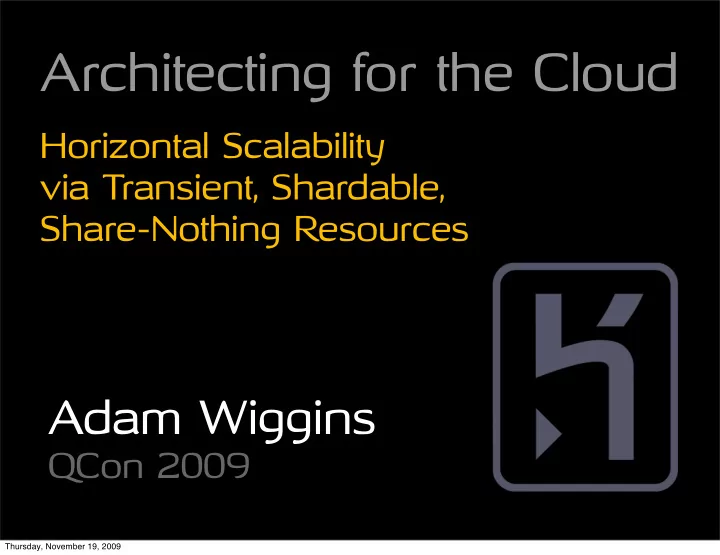

Architecting for the Cloud Horizontal Scalability via Transient, Shardable, Share-Nothing Resources Adam Wiggins QCon 2009 Thursday, November 19, 2009
Thursday, November 19, 2009
Heroku is home to over 40,000 applications Thursday, November 19, 2009
Automatically scaling apps - without code changes Thursday, November 19, 2009
Enabling factors: Thursday, November 19, 2009
Enabling factors: • Virtualization Thursday, November 19, 2009
Enabling factors: • Virtualization • Cloud (virtualization as a service) Thursday, November 19, 2009
Cloud is about horizontal scalability Thursday, November 19, 2009
Scale out instead of up to avoid the ceiling of Moore’s law Thursday, November 19, 2009
Taking advantage of cloud: shardable resources Thursday, November 19, 2009
Resources, aka software infrastructure: • Database • Caching • HTTP router • Message bus Thursday, November 19, 2009
The father of modern shardable resources: memcached Thursday, November 19, 2009
“hashtable in the sky” Thursday, November 19, 2009
Built by one of the first web-scale produts: LiveJournal Thursday, November 19, 2009
Facebook: 800 memcached servers supplying 28 terrabytes of memory http://www.facebook.com/note.php?note_id=39391378919 Thursday, November 19, 2009
Pricinples • Transient • Shardable • Share-nothing Thursday, November 19, 2009
Transient Any node in the cluster can be lost Thursday, November 19, 2009
Shardable Client lookup by hashring Thursday, November 19, 2009
Thursday, November 19, 2009
Share nothing Nodes are unaware of each other Thursday, November 19, 2009
Is memcached is cheating? Thursday, November 19, 2009
CouchDB Thursday, November 19, 2009
CouchDB • Document database Thursday, November 19, 2009
CouchDB • Document database • Eventual consistency Thursday, November 19, 2009
CouchDB • Document database • Eventual consistency • MVCC Thursday, November 19, 2009
Eventually consistent Thursday, November 19, 2009
Multiversion concurrency control instead of locking Thursday, November 19, 2009
Comparable to a distributed source control system Thursday, November 19, 2009
Transient No master server Thursday, November 19, 2009
Shardable Clients can go to any server Thursday, November 19, 2009
Share nothing Nodes communicate only when asked to replicate Thursday, November 19, 2009
CouchDB: The Definitive Guide http://books.couchdb.org/relax/ Thursday, November 19, 2009
Hadoop big data processing • MapReduce • Cut big data into small chunks • Cut big work into distributable jobs http://hadoop.apache.org/ Thursday, November 19, 2009
Redis key-value store • Like memcached with persistence • Shards with hashring • Lists and sets • Extremely fast and lightweight http://code.google.com/p/redis/ Thursday, November 19, 2009
Varnish http cache • Like Squid, but horizontally scalable • Combine with ngx_http_upstream_consistent_hash for hashring-style access http://varnish.projects.linpro.no/ http://wiki.nginx.org/NginxHttpUpstreamConsistentHash Thursday, November 19, 2009
RabbitMQ message bus • Job queueing • Cluster broadcast via exchanges • Cross-language http://www.rabbitmq.com/ Thursday, November 19, 2009
Erlang functional language • High concurrency • No mutable variables • Lightweight processes http://www.erlang.org/ Thursday, November 19, 2009
Horizontal scalability promises to shatter the glass ceiling of vertical scale Thursday, November 19, 2009
...but only if we architect resources to be transient, shardable, and share-nothing Thursday, November 19, 2009
The End. http://heroku.com Adam Wiggins http://adam.blog.heroku.com Thursday, November 19, 2009
Recommend
More recommend